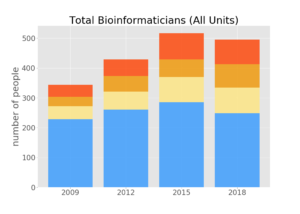Introduction
Bio-IT is a community initiative, which aims to build, support, and promote computational biology activity at EMBL Heidelberg. Bio-IT community members help each other conduct their research, and share their skills, experience, and tools with others. The Bio-IT portal reports the activities organized in this framework.
The Bio-IT Project aims to achieve its objectives through activity in four areas:
- training and consultation
- regular networking of interested parties, encouraging community building and knowledge transfer between computational biologists
- establishing and maintaining community resources
- providing support for bioinformatics tools and services
Bio-IT Mission
To provide EMBL-HD with a platform for information and discussion about bioinformatics and to promote networking amongst its diverse bioinformatics user community.
Please visit the Bio-IT portal for more details of project activities.
Motivation
The computational biology community at EMBL is growing steadily and rapidly. This is a reflection of EMBL’s position at the forefront of cutting-edge data-driven research, but brings with it some challenges. The Bio-IT project is a community initiative, which aims to build, support, and promote computational biology activity at EMBL. The objective is for community members to help each other conduct their research, and to share their skills, experience, and tools with others.

Every three years, Bio-IT carries out a survey of bioinformatic activity in groups at EMBL Heidelberg. This data shows that computational activity continues to grow across all research units.
The broad range of different research foci at EMBL, and the co-existence of predominantly computational- and bench science-focussed groups, presents challenges for the development/maintenance of a unified bioinformatics community. These are the challenges that the Bio-IT project is attempting to tackle, by encouraging interaction, knowledge transfer, and collaboration between computational scientists and support staff drawn from across EMBL.
